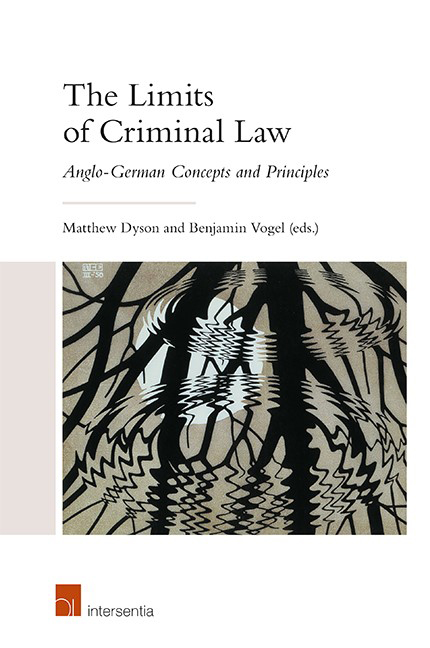Book contents
- Frontmatter
- Preface
- Contents
- List of Cases
- List of Abbreviations
- List of Contributors
- Chapter 1 Introduction
- PART I CORE PRINCIPLES OF CRIMINAL LAW
- PART II CRIME AND TORT
- PART III CRIME AND MEDICAL
- PART IV CRIME AND REGULATION
- PART V ADMINISTRATIVE SANCTIONS
- PART VI ALTERNATIVE ENFORCEMENT
- PART VII COUNTER-TERRORISM
- PART VIII CRIME AND INTELLIGENCE
- PART IX CONCLUSION
- Index
- About the Editors
Chapter 3 - The Core Legal Concepts and Principles Defining Criminal Law in Germany
Published online by Cambridge University Press: 11 February 2021
- Frontmatter
- Preface
- Contents
- List of Cases
- List of Abbreviations
- List of Contributors
- Chapter 1 Introduction
- PART I CORE PRINCIPLES OF CRIMINAL LAW
- PART II CRIME AND TORT
- PART III CRIME AND MEDICAL
- PART IV CRIME AND REGULATION
- PART V ADMINISTRATIVE SANCTIONS
- PART VI ALTERNATIVE ENFORCEMENT
- PART VII COUNTER-TERRORISM
- PART VIII CRIME AND INTELLIGENCE
- PART IX CONCLUSION
- Index
- About the Editors
Summary
This chapter explores the core concepts and principles of German criminal law, in particular the applicable constitutional law framework, the general substantive concepts of the Criminal Code and the main features of criminal procedure. Legislation, constitutional jurisprudence and doctrine aspire to form a coherent structure that runs from constitutional to substantive to procedural law and that guides decision-making at all levels of the criminal process.
BACKGROUND
German criminal law is primarily founded on two codifications: the Criminal Code (Strafgesetzbuch) and the Code of Criminal Procedure (Strafprozessordnung). The Criminal Code consists of a General Part that provides for the general principles of criminal liability and sentencing, and a Special Part that contains the definition of offences. Criminal offences are also contained in numerous special laws outside the Criminal Code, where criminal provisions are often added to underpin a broader regulatory legal framework. Despite the existence of such special laws, German criminal law continues to be dominated by these two codifications, which since the nineteenth century have become the bedrock of the legislative endeavour to ensure both legal certainty and systematic coherence of the law. Going well beyond a mere compilation, this continuing, constantly updated codification of substantive and procedural law allows the harmonious integration of new social phenomena and legislation into the existing body of laws. German law's strong attachment to the idea of codification is intended to prevent the clashes between different areas of law which might result from a piecemeal approach. In addition, codification is also characterised by the development of an abstract (that is, not case-specific) set of rules which allows the legal system to flexibly respond to social developments while at the same time avoiding piecemeal legislation.
The aforementioned codifications demonstrate German criminal law's heavy reliance on academic doctrine. The rise of this doctrine can be observed through the development of modern codifications in the nineteenth century, beginning with the Criminal Law Statute of the Kingdom of Bavaria in 1813, which was authored by renowned jurist Anselm von Feuerbach and is considered the starting point for a liberal and reason-based criminal law. Inspired by Enlightenment philosophy, notably by the thinking of Immanuel Kant, criminal law doctrine has since then shaped German criminal law in an endeavour to ensure the rational coherence of the law and to keep infringements of pure morals (as opposed to infringements of rights) out of the sphere of state punishment.
- Type
- Chapter
- Information
- The Limits of Criminal LawAnglo-German Concepts and Principles, pp. 39 - 70Publisher: IntersentiaPrint publication year: 2020

